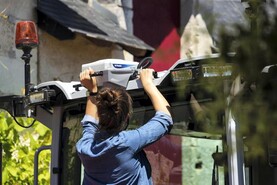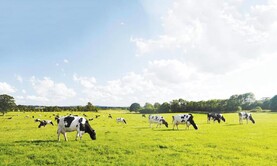I always enjoy the scenic drive up to Dromone. It’s a tiny village nestling in a sleepy valley in the western extremity of Co Meath, the piece which protrudes greedily into Westmeath. The Cavan border isn’t far away either.
It’s not typical Meath land; it’s drumlin-like countryside where many of the roads are twisty leafy lanes and the fields are smaller. But it’s very picturesque.
Meath’s only mountain and highest point, Slieve Na Calliagh, with a modest summit of 276m overshadows the area.
There is a pre-Christian burial mound on the summit which is well worth a visit on a clear day, offering views of the Slieve Blooms in the south and up to the Cooley Mountains in the north.
While there are traces of potato beds up on the grassy summit, tillage has long since disappeared from the area and sheep and sucklers dominate.
However, if I paint a picture of a place where time forgot, this couldn’t be further from the truth. I think the Cavan people are very industrious and this driven shrewdness and entrepreneurship has clearly crossed the soft border into this outpost of Co Meath.
Industry
So Dromone has become the unlikely industrial Ruhr Valley of Co Meath and is home to three important agricultural engineering works, all within a mile of each other. The banter in Teddy’s pub in Dromone is not so much about the price of cattle but the price of steel. With that said, there’s also a meat factory in the parish. We’ll now go on a tour of the three works.
Dromone Engineering is the leading Irish agricultural manufacturer of OEM hitches for all Massey Ferguson, Claas, Landini, Kubota, Same, Deutz and McCormick tractors on the European market. It also manufactures quick hitches for Volvo excavators amongst others.
Dromone is run by managing director William Egenton and it employs over 130 people in its state-of-the-art factory where the first robotic welder was installed 20 years ago.
Steel is laser-cut, with material going in one end and cut component out the other, in a highly automated process.
Next up is Hand Engineering, a very innovative company which was set up by Darragh Hand in 1995. It carries out all sorts of design and fabrication work and is Ireland’s leading manufacturer of mini-digger attachments.
But perhaps Hand Engineering are best known as the designers and manufacturers of Zero Grazer wagons which are marketed under the Zero Grazer brand.
It’s a superbly engineered machine and when an Irish dairy farmer can’t break it, nobody will. They build up to 50 Zero Grazers per year and export into Europe.
Thirdly, Gibney Steel Products manufactures a quality range of what we’ll call farmyard furniture. Things like gates, hurdles, feeders, troughs, all that sort of thing. The company was set up in 1973 by Oliver Gibney and employs 40 people in Dromone, with an additional factory in Co Down. If you have a gate, it’s probably a Gibney as they make thousands of them and have the lion’s share of the Irish market.
So where do these gates all go and is the market not saturated?
No, Irish farmers love wrecking gates. We drive into them and over them, Limousins get wrapped up in them and milk lorries use them as bull bars. Gibneys can’t make enough of them.
Finally, last weekend, the always enterprising Dromone village hosted its annual JFK 50 Mile Challenge Walk which raises huge amounts for charity each year.
Was I on it? Eh, no, I wasn’t, but I should have been. I stepped on a pallet weighing scales in Dromone Engineering and I was nearly sick. I’ll have to give up the wine gums and the HB Brunches.
Choc-ices should be OK.






 This is a subscriber-only article
This is a subscriber-only article









SHARING OPTIONS: